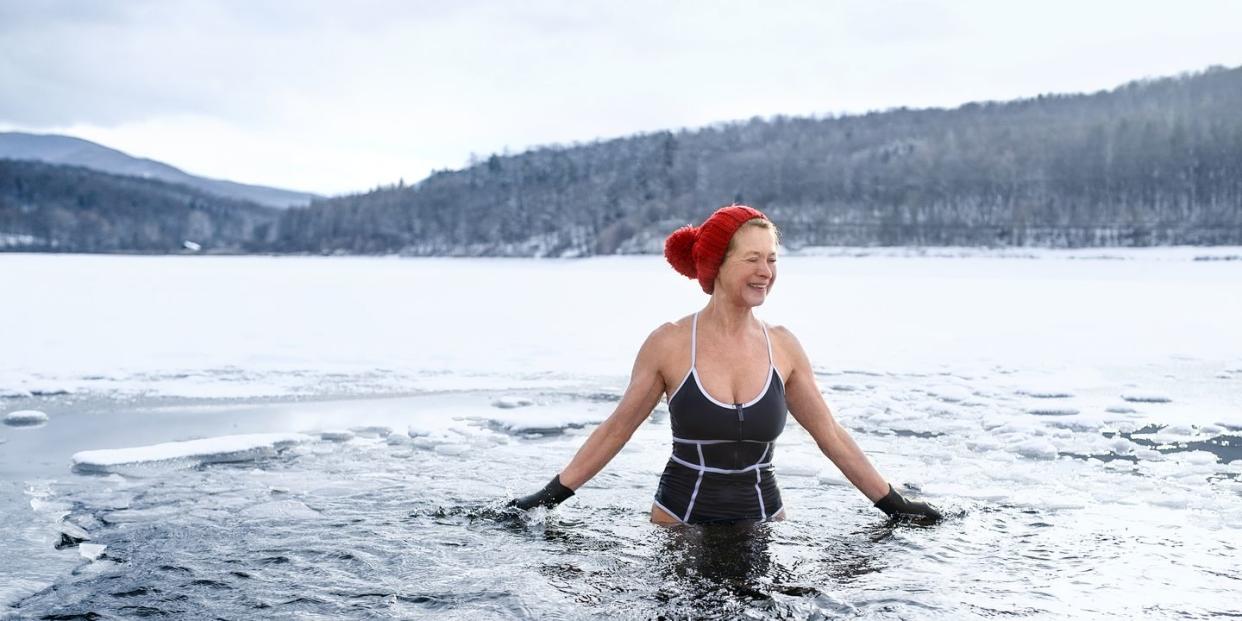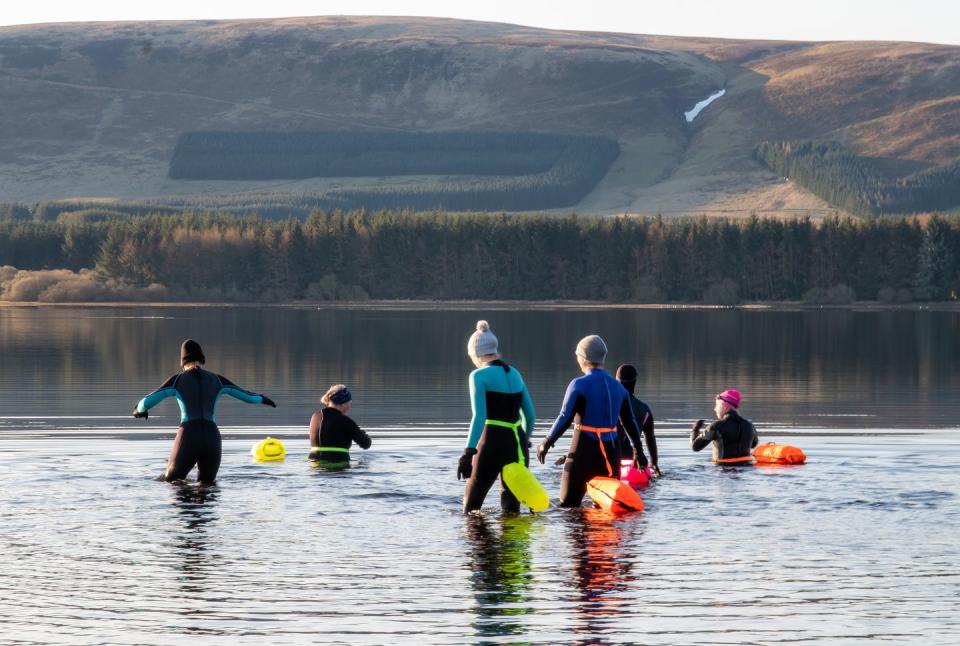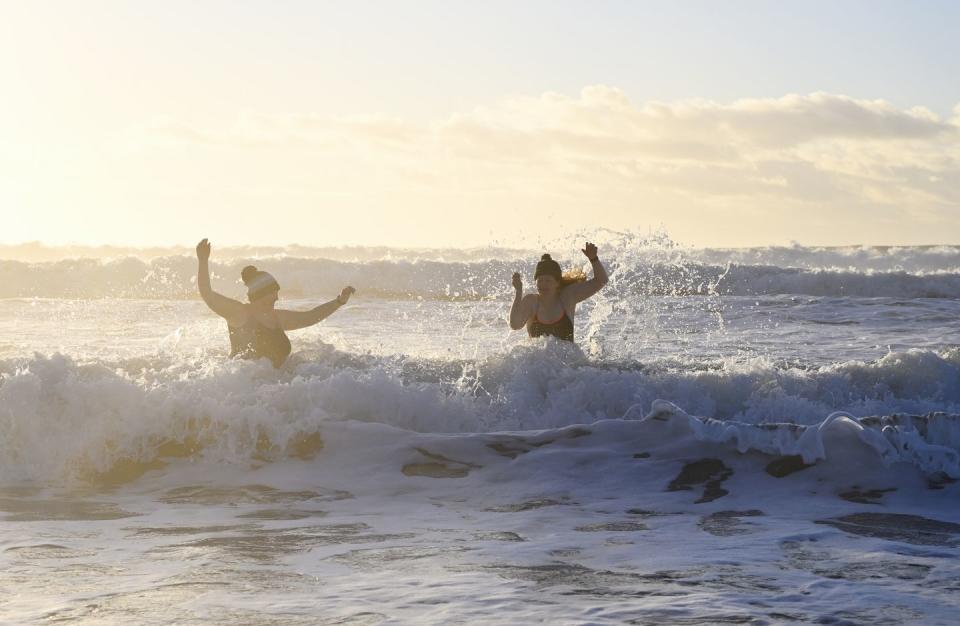Can cold-water swimming really ease menopause symptoms?

Cold-water swimmers are an enthusiastic bunch. Come across one at the water’s edge and they’ll flood you with reasons why they love taking a dip. It might give them energy, help them manage stress or ease aches and pains.
Many of the benefits have been confirmed by a recent University College London study, which found that women with menopausal, perimenopausal or menstrual symptoms who regularly swim outdoors feel physically and mentally better.
The research, led by Professor Joyce Harper, of UCL’s Institute for Women’s Health, surveyed over 1,000 committed cold-water swimmers. Of the 785 women going through the menopause, nearly half said swimming reduced their anxiety, while a third said it cut their mood swings, low mood or hot flushes.
Women with menstrual symptoms experienced similar benefits: again, nearly half reported lower anxiety.
Over a third also said it moderated their fluctuating moods or eased their irritability.

In the UCL study, Professor Harper highlighted that some women find cold-water swimming eases physical symptoms of the menopause such as hot flushes and aches and pains.
All exercise eases symptoms, but going for a cold-water dip might be especially effective at removing discomfort because our fight-or-flight hormones work as a natural painkiller. They also have an anti-inflammatory effect.
Dr Katie Armstrong, a GP and founder of Clinic51, a service helping women through the menopause, welcomes the study for showing that midlife presents an opportunity for women.
“We need more evidence before we encourage everybody to take the plunge, but that doesn’t mean we should dismiss it,” she says. “Cold-water swimming may well help. There’s no harm in giving it a try.”
Many women will find that hormone replacement therapy eases some symptoms, but even more might benefit from a holistic approach, suggests Dr Armstrong.
“HRT is never going to make you feel better than you did when your ovaries were working,” she says. “For a real improvement, you might need to look at other aspects of your life.”
Mood swings can be a big factor during the menopause and just before periods, because of a drop in oestrogen. But cold-water swimming – a plunge in water below 15C – can give you a natural high that lasts up to four hours.
Cold water boosts our levels of dopamine, the brain chemical behind our motivation and feelings of reward, by an enormous 500%. The cold also stimulates the release of our happy hormones, beta-endorphins and serotonin.
Clinic51 runs cold-water retreats, where women are taught breathwork and offered a plunge in an ice bath.
“Everybody comes out feeling a release,” says Dr Armstrong, who also enjoys the odd cold dip. “For some women, that’s an emotional release. Other women have this real high. Many feel this sense of achievement because they’ve challenged themselves.”

I’ve felt that buzz first-hand. I loathe the cold, so friends were astounded when I started wild swimming. But, having heard about the mental and physical benefits, I was desperate to give it a go.
Ahead of my first wild swim last year, I prepared myself for the chill by ending my showers with a burst of cold water for weeks beforehand. But in the water, I discovered that my cold aversion was nothing unusual - everyone takes a while to acclimatise to the cooler temperature. Everyone should start with very short dips and you can also splash water on your neck and face as you wade in.
Even experienced swimmers aren’t oblivious to the water's cold temperature. The bracing cold makes us pay attention to the moment as we become hyperaware of our bodies. When I’m in the water, I can’t think of anything else. It makes me focus. The experience then becomes mindful.

It's no wonder then that cold-water swimming could also help our body deal with stress, making us less anxious and more resilient. The shock of the cold causes our sympathetic nervous system to kick in, triggering our flight-or-fight response.
I get through this by taking deep breaths. This slows down my heart rate and lowers or stabilises blood pressure. It also activates the parasympathetic nervous system, the network of nerves that relaxes us. Triggering our parasympathetic nervous system, as well as our sympathetic one, creates conflict in our body. This might teach our body to cope better with stress outside the water.
But, like the UCL study suggests, the benefits of cold-water swimming can extend far beyond our own health. It connects women with other people and nature. Since becoming a wild swimmer, I have made new friends and am now a member of several more WhatsApp groups.
So, perhaps its power isn’t in one element alone, but a combination.
The Little Book for Wild Swimmers by Laura Silverman (Summersdale, £8.99) is out on 8 February.
Good Housekeeping's resident GP, Dr Sarah Jarvis, weighs in...
"There are indeed lots of health benefits claimed for cold/wild swimming.
However, it is important to note that cold immersion does carry risks. It’s important to prepare, to get acclimatised and very important to be supervised if you’re wild swimming.
In the first few seconds after you get into cold water, your lungs contract in a gasp reflex. If you’re under the water when this happens, you can inhale water, which can cause serious problems. You can then hyperventilate and lose breathing control. This phase tends to last just a few minutes. With experience, you become more resistant to this ‘cold shock reaction’.
If you keep swimming, it is possible to get cold incapacitation, where your body’s surface blood vessels shut down to maintain temperature in your inner organs. This can lead to reduced muscle power and difficulty getting out of water, because you can’t grip or pull yourself out.
Sudden cold exertion can trigger asthma symptoms in some people with asthma. It can also trigger a heart attack, especially if you have high blood pressure or existing heart problems. If you have any of these conditions, or if you’re pregnant, never go wild swimming without getting yourself checked out by a doctor first."
You Might Also Like


